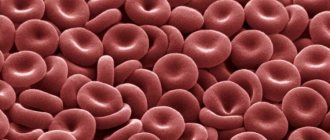When planning a pregnancy, a blood test of the future parents is mandatory. Blood group compatibility is a very important study that allows you to prevent the occurrence of dangerous situations when carrying a baby. This is why pregnancy is planned in order to identify and mitigate possible risks in advance, so that nothing threatens the course of pregnancy and the development of the child.
There is a widespread belief that there are incompatible blood groups that prevent conception, many are absolutely convinced of this. Also, everyone wants to know what blood type and Rh factor their child will have. However, there is no clear answer to this question. It all depends on many factors. Let's try to figure this out together.
Blood groups
One of the most important tests in preparation for pregnancy is to determine the blood type and Rh factor of both parents. This test can be done for free at your nearest clinic.
Why do you even need to know blood groups and Rh factors for those who are planning to conceive a child? Is blood really important for conception? If you ask a gynecologist this question, he will immediately answer that such an analysis is absolutely necessary! After all, the results obtained will help determine possible support schemes for bearing a child.
The fact is that during pregnancy, especially in the early stages, there are various risks of miscarriage. Pregnancy is very vulnerable, especially at the beginning. Knowing the blood groups and Rh factors of both parents, the gynecologist will be able to quickly prescribe effective medications. Timely treatment can save a child in an emergency.
Here's how blood is divided into groups (sets of specific proteins alpha and beta agglutinogens A and B):
- The first blood group is 0 (this blood group does not contain proteins A and B).
- The second blood group is A (there is only A protein).
- The third blood group is B (there is only B protein).
- The fourth blood group is AB (there are both proteins, A and B).
HLA incompatibility
This is one of the types of immunological infertility. In addition to antisperm antibodies, incompatibility during conception can be caused by the HLA system (histocompatibility antigens). There are specific proteins on the surface of all cells in the human body. They are individual to each person, just like fingerprints.
During pregnancy, the child inherits one half of the complex of these proteins from the mother, the other from the father. The mother's immune system perceives such a fetus as a foreign object and produces specific blocking antibodies that stimulate the further normal development of pregnancy.
What could happen if the genes of the baby’s parents turn out to be similar in the HLA system? The mother's body will not perceive the fetus as a foreign object, the production of antibodies will not occur and the pregnancy will stop developing.
Fortunately, this is very rare. Experts are wary of this type of incompatibility among consanguineous couples.
Rh factor
When planning a pregnancy, it is also important to determine the Rh factor of both sexual partners. After all, the Rh factor determines the sexual compatibility of future parents. A blood group and Rh factor test is a kind of determination of blood compatibility for conception, in preparation for pregnancy. These analyzes definitely should not be neglected.
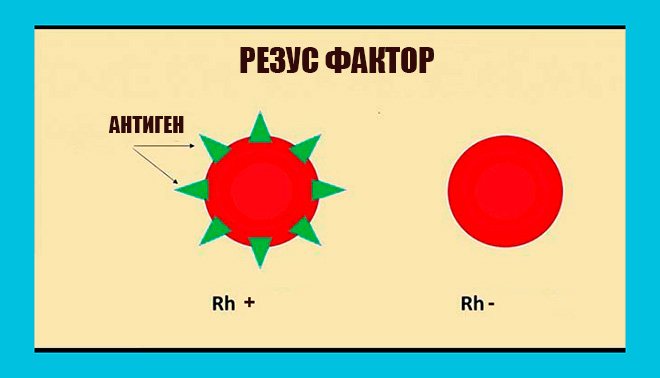
On the left is an erythrocyte with a specific protein (antigen), in this case Rh positive (i.e. there is an antigen). There is no antigen on the right, so it is Rh negative.
How is Rhesus determined?
Rhesus (Rh) can be positive or negative. With positive Rh (Rh+), specific Rho(D) antigens and proteins are present in the erythrocytes. A negative Rh factor (Rh-) means that there are no such specific proteins and antigens in red blood cells.
It is important ! After determining the Rh factor, it is recommended to put a stamp in the passport with information about the blood type and Rh factor. This can be done at a clinic or other medical institution where the blood test was taken. A simple stamp in your passport can save a life! In emergency situations, when the patient is taken to the hospital unconscious and urgent blood transfusion is needed, this stamp will be very useful. It often happens that there is no time for analysis, and blood transfusion cannot be postponed.

This is what a stamp in a passport looks like with your blood type and Rh factor. It's better to have it than not to have it.
Positive Rh in the mother
If the mother has a positive Rh factor, then the negative Rh factor of the man does not affect the development of the fetus. When a child inherits Rh negative, a conflict does not arise, because there is no protein in the child’s blood that would be unfamiliar to the woman’s immune system.
Rhesus compatibility:
- If the mother is Rh positive and the father is Rh positive, the child inherits Rh positive. There will be no complications.
- Positive mother and positive father, the child inherits negative. There will be no complications; the mother’s body does not react to the elements of the child’s blood.
- Positive mother and negative father, the child inherits positive. The protein in the mother’s blood is “familiar” to the immune system, so the protein in the child’s blood is not perceived as foreign.
- Positive mother and negative father, the child inherits the negative one. There is no protein in the child’s blood, no reaction occurs.
In all cases, the child’s body will not contain elements that are unfamiliar to the mother’s immune system.
Interesting opinion about blood groups and Rhesus
You can often hear the opinion that the first blood group is the best for pregnancy. Women with the first group are more likely to give birth to healthy children, without defects or congenital diseases. It is believed that women with the first blood group are most suitable for egg donation and surrogacy due to maximum compatibility with other blood groups (especially with the same Rh).
There is also an interesting popular opinion that with the first blood group, a person’s diet contains more meat products. The second blood group prefers fruits and vegetables. The third group loves flour dishes. It is interesting that there are no opinions at all about dietary preferences among those with the fourth blood group.
Naturally, all these opinions are unconfirmed rumors that have no scientific basis. Therefore, doctors recommend treating such “facts” with caution.
What is the danger of Rh conflict?
The blood of a developing baby, entering the mother’s body, is attacked by immune antibodies, as it is perceived as a foreign and dangerous substance. This leads to the fact that the baby’s red blood cells begin to disintegrate, which provokes very dangerous consequences, in particular:
- Many children, when born in this situation, experience jaundice, which requires proper treatment.
- Some children experience thrombocytopenia of an alloimmune nature.
- Many children experience a significant increase in the size of internal organs , mainly the heart, kidneys, and liver, which can be detected even during the gestation period during ultrasound,
- Varying degrees of fetal hypoxia may be observed.
- Hemolytic anemia.
If, when symptoms of Rh conflict appear with a child, no necessary measures are taken, then the consequences can be the most disastrous.
Pregnancy miscarriage often occurs at any stage. At the beginning of development, in the first trimester, a miscarriage is possible. If the pregnancy continues in the early stages, then you should be wary of not only premature birth, but also the birth of a dead baby or a sick child with a serious degree of edema syndrome or dropsy.
Blood type compatibility: truth or myth?
Let's see if there really is blood type incompatibility? Many are simply convinced that if a man has blood type 1 and a woman has blood group 2, then they are completely incompatible and it will be extremely difficult, almost impossible, for them to conceive a child. The same applies to people with the third and fourth groups. According to those who claim the existence of incompatibility based on blood groups, sexual partners should have the same blood type. Otherwise, you won’t be able to get pregnant!
There is one more, I will immediately say a dubious statement, that even if by some miracle conception occurred in people with different groups, they will certainly have a weak, sick child.
On the Internet you can even find compatibility tables for sexual partners by blood type. You need to understand that not every table on the Internet is the ultimate truth. We asked an experienced gynecologist to help us understand this issue.

Here is a striking example. Here is a compatibility table for blood groups for conceiving a child. Pay attention to the bold print, the verdict is clear - this is a fake!
Immunological infertility
This type of couple incompatibility is associated with the formation of special ones, both in women. In men, such antisperm antibodies are formed in the sperm itself, which causes. This disrupts their mobility and fertilizing ability. Inflammatory processes in the body, trauma to the genital organs, varicocele and other pathologies contribute to the formation of these antibodies.
In women, antisperm antibodies can be found in the lubricant, which is synthesized by the mucous membrane of the cervical canal, less often the mucous membrane of the uterus or fallopian tubes. When sperm enters the vagina, these antisperm antibodies cause complete sperm immobility, and conception becomes impossible.

What do doctors say about blood group compatibility and the magic table?
If you ask any gynecologist or obstetrician about the blood type compatibility of sexual partners, then with a 146% probability he will answer you that this is all nonsense, dregs and compote! In other words, nonsense.
But numerous tables from the Internet come to mind, where it is clearly stated that a man with the first group is not suitable for a woman with the second, what to do? Doctors warn that such tables are often manipulated by various kinds of “doctors” and “specialists.” Woe healers vying with each other to shout about blood type incompatibility if a couple faces problems conceiving. Although the problem lies elsewhere (you can read briefly about the possible causes of infertility here).
Remember ! Blood groups have absolutely no effect on the ability to conceive. This is a myth and it needs to be destroyed! Gynecologists note that if problems arise with conception within 5 months, you should consult a doctor (gastrointestinal tract and urologist). Do not self-medicate under any circumstances and do not look for a new sexual partner that suits you according to the table.
To destroy this dangerous myth yourself, find out your blood type from your parents. Ask your friends, acquaintances, and work colleagues who have children what their blood type is. After such a small sociological survey, you will be surprised to discover that blood types do not matter at all! It doesn’t matter what blood type the parents have (1 and 2, 2 and 3, 3 and 4, 4 and 1, etc.).
Incompatible groups
The likelihood of a confrontation between antibodies and red blood cells increases if the embryo has a different group with the mother.
Despite the successful conception of a child, during pregnancy the body accumulates antibodies, which are activated during the newborn period, lysing red blood cells.
The fourth positive blood type of the embryo may conflict
with 0, A or B antigens of mothers' red blood cells.
The greatest danger awaits carriers of 0Rh- when antigens II or III are detected in children.
What blood types are incompatible at conception? Doctors pay special attention in the following situations:
- A woman has type I heme, her partner has any other.
- Mom has II, and dad has III or IV.
- Men A or AB have wife B.
In fact, there is no problem of blood group compatibility for conceiving a child.
There is only a predisposition to the manifestation of certain pathologies, which can be avoided if you follow the recommendations of the gynecologist.
When conceiving, it is necessary to pay special attention not to the blood groups of the parents, but to the combination of the negative Rh factor of the mother with the positive Rh factor of the father.
The post-industrial lifestyle is accompanied by a decrease in the birth rate. The health of the unborn child is influenced by many genetically determined circumstances. The most dangerous is the combination of an Rh-negative mother with a father who has this antigen.
Immunological incompatibility
Immunological infertility (incompatibility of sexual partners), unlike incompatibility of blood groups, really exists. This is a relatively rare disease that prevents sperm from passing into the uterus and fallopian tubes.

Unfortunately, immunological infertility is quite common. People have been trying to get pregnant for years, but nothing works. It seems that your health is fine and your tests are normal, but the doctors shrug their shoulders. However, there is no need to despair in such a situation. Modern methods of assisted reproductive technologies cope well with this problem.
Spermatozoa due to immunological incompatibility cannot cross the cervical canal of the cervix. A woman’s immune system, for no apparent reason, perceives the sperm of her sexual partner as a foreign body and neutralizes them.
Some “healers” directly point to immunological infertility as a consequence of blood incompatibility. However, official medicine clearly answers that blood groups have no significance in immunological infertility. This is a completely unrelated blood type disease.
Immunological infertility can be cured. Even if treatment does not help, you can resort to ART methods and implant sperm directly into the uterus (bypassing the cervical canal). In this case, immunological infertility is overcome.
Incompatibility and conception
Immunological infertility
It can be diagnosed in completely healthy spouses. The incentive to make such a diagnosis is the lack of conception in a couple who does not practice any means of contraception. If the situation persists for a year, doctors usually suggest special therapy.
Medical statistics highlight a group of couples suffering from immunological incompatibility. This trouble explains infertility in six percent of cases. The condition of immunological infertility is the death of male germ cells inside the female body.
For some reason, the female defense system recognizes sperm as unwanted bodies. As a result, the environment becomes aggressive due to increased production of special antibodies. Their activity leaves no viable sperm. In cases where conception does occur, there is a high probability of spontaneous termination of pregnancy or the presence of severe toxicosis. To get out of this situation, special therapy is used.
Partners who have taken a genetic compatibility test wait a couple of weeks for the results. At this time, DNA is isolated from the collected blood in a laboratory setting, and the necessary genes are checked. A rather rare situation is complete incompatibility of a couple at the genetic level. But today this cannot become an obstacle to the further reproduction of such a family. If desired, you can undergo a thorough examination. Pass the necessary tests, according to experts. Next, together with the doctor, procedures are selected to help with conception, normal gestation and birth of children.
Rh factor incompatibility
It is known that Rh conflict does not affect the very fact of conception, but can cause serious deviations in the development of the fetus. For a successful pregnancy, it is considered a positive thing that the spouses have the same blood characteristics, that is, they must have the same blood. For example, each of the couple has a positive Rh, or vice versa, both partners have a negative indicator. If spouses with different Rh factors are trying to conceive offspring, a preliminary course of treatment is required. The goal of such therapy is to influence the woman’s body in such a way that fetal rejection does not occur.
They say that the guarantee of normal childbearing in a family is the presence of a man with a higher blood group than a woman. Based on research by geneticists, it can be argued that children more often inherit maternal blood characteristics and the paternal type of Rh factor.
Incompatibility at conception:
may be caused by various factors, so you need to consult a specialist for further action
Conflict of Rh factors during pregnancy
When planning a pregnancy, the Rh factor of both parents should definitely be studied. The fact is that in rare cases, Rh conflict occurs at the beginning of pregnancy. Rhesus conflict can only occur between mother and child.
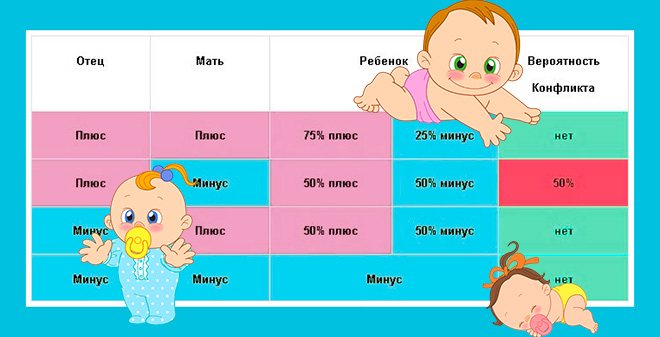
Table of Rh conflict between parents and child.
For example, parents with different rhesus, the child inherited the opposite rhesus from the mother. If the mother and child have different Rhesus, in rare cases, Rhesus conflict may occur. The mother's immune system may perceive the fetus as a foreign body and begin to produce antibodies to fight it. At this moment, a dangerous situation of Rh conflict arises, which can lead to termination of pregnancy. At this point, it may be necessary to prescribe medications to suppress the mother's immune system. Other means to maintain pregnancy may also be prescribed.
Listen carefully to what the doctor says in this video. He talks very clearly about the conflicts between the Rhesus of parents and children:
Rh incompatibility between mother and child is successfully overcome. However, this usually applies to the first pregnancy. The situation is more complicated during the second and subsequent pregnancies. After the first pregnancy with an Rhesus conflict to the fetus, the mother's immune system will more actively resist subsequent pregnancies with the opposite Rhesus. This important factor must be taken into account when planning pregnancy .
Diseases that increase Rh conflict
There are diseases that can increase the production of antigens in the mother's body. Such diseases include:
- diabetes;
- increased uterine tone;
- gestosis.
The baby in the womb can also develop various diseases:
- dropsy of the brain;
- hepatitis A;
- anemia (anemia).
It is worth understanding that all this can be avoided with proper, timely detection and treatment. Modern medicine can save a child’s life and health even if a Rhesus conflict is detected.
What is a conflict pregnancy and what to do when it occurs?
Compatibility by blood group and Rh factor plays an important role when bearing a child. An unfavorable combination is a negative blood group in the mother and a positive blood group in the fetus (inherited from a father with a positive group in 50% of cases). With this combination of Rh factors, pregnancy is conflicting and dangerous for both mother and child.
If, while carrying a child, its Rh positive blood enters the mother’s bloodstream (perhaps in rare cases), it will be recognized as a “foreign body” that needs to be attacked and destroyed.
As a result, the brain sends a signal to destroy and remove the “dangerous guest”. This “attack” is aimed at destroying the child’s red blood cells, since they contain the “D” antigen.
As a result, a conflict pregnancy can have the following consequences for the child and the mother:
- fetal death (possibly at any stage), the pregnancy is considered frozen and it is necessary to artificially terminate the pregnancy;
- due to the destruction of red blood cells, the child’s liver produces bilirubin, and jaundice develops. The pathology is dangerous due to a lack of red blood cells, which deliver nutrients and oxygen throughout the child’s body. A deficiency of these substances causes a delay in the mental and physical development of the fetus, as well as impaired organ development;

- due to the active destruction of the fetal red blood cells by the mother’s antibodies, there is an increased load on the child’s liver and spleen, as a result of which these organs can be depleted or destroyed;
- hypertonicity of the uterus with subsequent development of miscarriage.
The likelihood of developing complications depends on the period at which the body began to destroy and reject the fetus. To prevent this reaction, the pregnant woman is under special supervision from a gynecologist throughout the entire period of pregnancy.
To detect antibodies in a timely manner, regular blood donation is required. If necessary, a medical professional will immediately administer an injection of anti-Rhesus globulin, which prevents the production of antibodies.
Additionally, during pregnancy the following procedures are performed:
- if “dangerous” antibodies have not formed in the mother’s body before the 28th week, then an “Rh vaccine” injection is performed, which prevents their formation;
- introduction of glucose, ascorbic acid or vitamin preparations into the mother’s blood. This allows you to reduce the reaction of the immune system to antigen “D”;
- in the presence of a large number of antibodies, hardware purification of the mother’s plasma is required.
If a woman’s antibodies have destroyed a large number of fetal red blood cells, then in a hospital setting the child (in utero) is given a blood transfusion. The procedure is dangerous and can cause damage to brain cells and impaired development of hearing and speech organs.

During a conflict pregnancy, doctors carry out therapeutic measures, trying to maintain the pregnancy until 34 weeks. Next, a caesarean section is performed.
It is important that the first pregnancy with Rh conflict is rarely accompanied by the development of complications. Subsequent pregnancies are considered the most dangerous if the woman is not given anti-Rhesus globulin after childbirth, which prevents the production of antibodies. This procedure is discussed with the gynecologist before delivery. You may need to purchase your own injection solution.
If the mother has a positive blood group and the fetus has a negative blood type (the Rh factor is inherited from the father), Rh conflict does not develop. It is important for every person to know their blood type and Rh factor, since, if necessary, this allows them to preliminarily determine blood compatibility during transfusion and when carrying a child.
Transfusion of incompatible groups is dangerous due to the adhesion and sedimentation of red blood cells, which leads to death. The presence of Rh conflict in a married couple is dangerous for the development of a defect in the child and miscarriage. That is why, when transfusions or planning pregnancy, doctors initially determine blood compatibility.
Author: Kotlyachkova Svetlana
Article design: Oleg Lozinsky
What is the treatment for Rhesus conflict?
There are several treatment regimens for rhesus conflict in a mother and her child. Here are some options for possible treatment, diagnostics and surgical actions:
- Biopsy of the chorion (embryonic membrane) of the child. This will reveal the child's Rh factor.
- Interval administration of anti-Rhesus immunoglobulin to destroy antibodies dangerous to the child.
- If necessary, perform an umbilical cord puncture.
- A course of vitamins.
- A course of anti-allergenic drugs.
- Stimulation of labor. This option will be considered as a last resort to save the child or his mother.
Since a conflict of Rh factors can be life-threatening, it always makes sense to plan a pregnancy. It is recommended to register with a antenatal clinic or gynecologist at a clinic. This is especially true for the second pregnancy and subsequent ones, if there was already a Rhesus conflict during the first pregnancy.
How to prevent possible complications?
Modern medicine has a sufficient number of ways to maintain pregnancy even in the event of a blood conflict between the mother and the developing child.
In case of Rh conflict, the pregnant woman should be under the supervision of doctors in order to prevent possible complications and problems. Medical measures in such situations are usually aimed at suppressing the immune system of the expectant mother and preserving the fetus, preventing its rejection. Most often, doctors periodically inject immunoglobulin into a woman and check the condition of the mother and child using special tests.
When pregnancy reaches 27–30 weeks, women with Rh-conflict are given a whole course of immunoglobulin injections in order to prevent possible pathologies and the onset of premature birth. Such measures make it possible to freeze a woman’s immune system, block the action of blood cells and allow the child to develop comfortably.

Of course, such a measure has a very negative effect on the mother’s condition, because the drug almost completely disables the immune system, which means that the body becomes defenseless even against the most common cold and various types of pathogenic microorganisms. At the same time, taking any medications for diseases is prohibited.
Child's blood type in the table
To roughly understand what the child’s blood type and Rh factor will be, you can study the corresponding table with possible options.
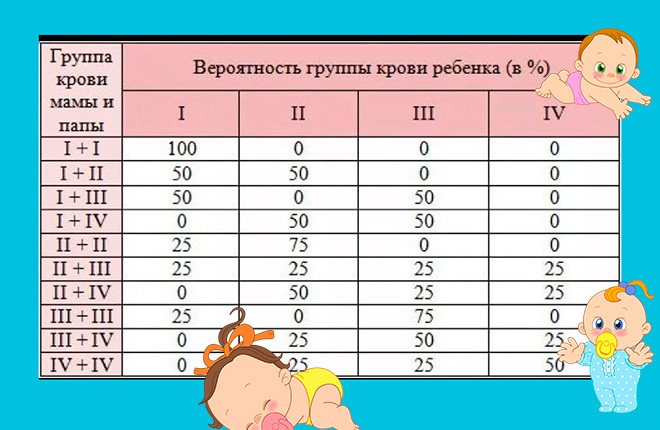
This table shows the possible blood types of the unborn child, taking into account the blood types of the parents.
Combinations of blood types of parents and child:
- Parents with the first blood group - the child will definitely have the first blood group.
- If the parents have the first and second groups, the child may have both the first and second groups.
- Both parents have the fourth blood group - the child can have blood of any type except the first.
- If the parents have groups 2 + 3, the child can receive any of the four blood groups.
Rh compatibility
What blood types are compatible? When both parents have positive or negative Rh, there will be no conflict between the mother and the fetus.
If the mother is Rh-, and the father is positive, there is a possibility of a conflict between the mother and the fetus.
The immune system is able to reject an antigen that a pregnant woman does not have. Gestation during which Rhesus conflict occurs can result in miscarriage
. If the child is born alive, anemia, dropsy, and mental development defects cannot be ruled out. The most common disease is hemolytic jaundice in infants.
Firstborns are lucky. The process of accumulation of antibodies is a long process. At the beginning of gestation, their titer is insufficient to cause significant damage to the fetus, and the already formed embryo is able to withstand the attack. The situation is worse when the pregnancy is not the first. The body remembers the stranger and attacks immediately. Similar cases occur if women have previously had abortions and miscarriages.
Diagnosis of incompatibility is carried out when anomalies of fetal development are established based on ultrasound results. Venous blood is taken from the mother, the DNA of the embryo is isolated, and it is examined to detect the fragment responsible for the production of the corresponding lipoprotein. If such a site is found, the fetus is considered Rh positive.
Women with the problem described are tested monthly
for antibodies.
If the answer is positive, the pregnant woman is hospitalized. The most effective, but also risky method of treatment is blood transfusion
to the fetus. Rh-mothers are given anti-Rhesus globulin, which sends a signal to immune cells to stop producing antibodies.
Questions to ask your obstetrician-gynecologist about blood
This chapter contains the most common questions to the doctor about the blood groups and Rh factor of the child and his parents. Carefully read the doctor’s answers - this will help reinforce what is described above.
Question No. 1 . If my husband and I have negative blood group 1, is this dangerous for our unborn child? Will there be a blood type or rhesus conflict?
Answer: There will definitely be no conflicts. The child will be negative Rh (Rh-).
Question number 2 . If I have 1 positive, and my husband has 1 negative, how dangerous is this for the health of the unborn child?

Answer: this is not dangerous; such a combination of blood groups and Rh factors of the parents cannot negatively affect the development of the child.
Question number 3 . I haven’t been able to get pregnant for a long time, more than 5 months of unsuccessful attempts. My husband and I have absolutely the same blood, 2 are negative. Could this be the reason?
Answer: no, blood of the same type and Rh factor cannot cause infertility. Contact the antenatal clinic for an examination by a gynecologist. The problem is definitely not blood groups. Long, unsuccessful attempts to get pregnant for six months or more give grounds to receive IVF services under a compulsory medical insurance policy.
Question number 4 . Is it bad for conception if my husband and I have blood type 3 with the same positive Rh factor?
Answer: no, your identical blood types and Rhesus numbers cannot affect conception in any way. There is no danger to the fetus.
Question number 5 . This is my first pregnancy, so far everything is fine, there is no rhesus conflict. My blood is group 3 negative, and my husband’s blood is group 2 with positive rhesus. Doctors told me that during the second and subsequent pregnancies, in our case, a Rh conflict is more likely than during the first pregnancy. I am prescribed immunoglobulin. Should I take it after giving birth?
Answer: Doctors are not deceiving you in this case. It is recommended to give the first immunoglobulin injections no later than the 3rd day after birth.
Question number 6 . We already have a child, he is our first-born. He was born absolutely healthy, although my husband and I have different Rhesus (I have -, he has +). Those. There was no rhesus conflict during the first pregnancy. But it happened during the second pregnancy. The result was terrible, the child did not survive. What should we do if a third pregnancy happens, what should we do to prevent the previous nightmare from happening again?
Answer: in your case, especially, you need to prepare for pregnancy in advance. This needs to be done correctly, by a good specialist.
It is also recommended to undergo a plasmapheresis procedure to cleanse the blood of antibodies dangerous to the child. This way the effect on the fetus will be less in case of Rhesus conflict development.
After pregnancy, you must check the amount of antibodies in your blood every month. At the first signs of sensitization (increased sensitivity to foreign substances), it is recommended to do plasmapheresis.
There is also the safest option for your situation - IVF. As part of this high-tech procedure, you can select only embryos with negative (like yours) Rh. Next, the best embryo can be implanted directly into the uterus. This way the risks will be minimized.
It would be a good idea to watch this short video, in which an experienced doctor talks about real-life cases of incompatibility of sexual partners:
Why is blood important in planning matters?
What is blood? The internal fluid of our body, which maintains its constancy and performs a great many functions - blood also plays a role in the processes of the birth of new life. Using a blood test, you can find out a lot of important information about the state of the body, for example, a blood test for hCG allows you to find out about pregnancy even before using test strips.
Whether you are planning a pregnancy in the near future or are already registered at the antenatal clinic, you (and then your spouse) will be asked to take a blood test that will determine your blood type and the presence/absence of antigen-D. These two values play a decisive role.
As is known, there are 4 generally accepted blood groups (0 (I), A (II), B (III) and AB (IV)), differing in the properties of antigen proteins, which, in turn, are located on the surface of red blood cells. There are also indicators of the Rh factor.
This is a kind of marker of the presence of D antigens on the same blood cells. We should talk about positive Rh if this antigen is detected, and, accordingly, if it is not there, then the Rh indicator will have a minus sign. By the way, there are relatively few people with negative Rh (about 15% of the total mass).
Speaking about the compatibility of blood groups for conception, some amendments need to be made. There is an opinion that a certain combination of parental blood types affects the likelihood of conceiving a child and even his future gender. Here, for example, is a table according to which it is supposedly possible to track the gender of the unborn child, knowing the blood types of the father and mother. There is a similar one regarding the compatibility of blood groups. The table illustrates whether parents are compatible with certain indicators.
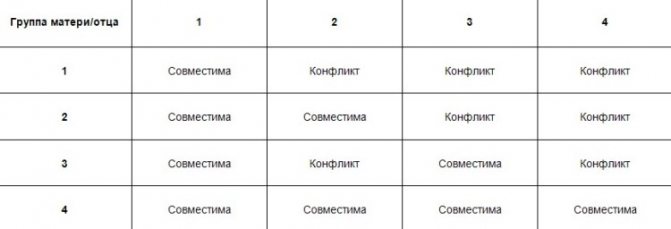
According to experts in the field of obstetrics and gynecology, only Rh affects blood compatibility for conception and subsequent bearing of a child. Therefore, you can rest easy: the sex of the unborn child and the chances of conceiving it are not affected by belonging to one or another blood group.
That is, all of the above tablets do not have the slightest scientific basis and are based on dubious data and conclusions of those people who have very mediocre knowledge in such matters.
You can address questions about which groups are incompatible or compatible, but this does not apply to family planning, but rather answers the question of compatibility if a blood transfusion is necessary. It is known that a certain blood is suitable for a certain person. For example, people with group I can be donors for everyone else, and those who have group IV can accept any blood group. Below is the group compatibility plate.

A simple survey can serve as proof that such conclusions are beyond reality. Take an interest in the blood types of your relatives and friends, they are probably all different. Different people connect their lives and give birth to children, having different marks about the blood type in their medical records. And all of them, one way or another, have children, and possible problems with conception probably have a completely different nature. Let's summarize: the course of pregnancy, if blood issues are raised, is affected only by the Rh factor. Let's talk about this in more detail.
Prognosis for pregnancy
You should not set yourself up in a negative way in advance if the future parents have blood type or Rh incompatibility. If you follow the rules of preparing for pregnancy at the planning stage and all medical recommendations, you have a very high chance of carrying and giving birth to a healthy baby.
If a woman has an Rh conflict with her child, then she will need to exercise extreme caution, follow all doctor’s instructions and undergo all prescribed procedures on time.
As a rule, it is impossible to accurately predict in advance the outcome of pregnancy and its course in the presence of certain blood groups, its compatibility and rhesus. Since a lot depends on the general condition of the parents’ body and their health.
